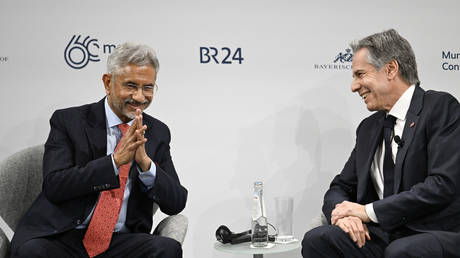New Delhi continues to maintain robust trade and diplomatic ties with Moscow despite criticism from the West as Russia has never hurt India’s interests, the South Asian country’s foreign minister underlined during an interview with the German daily Handelsblatt, published on Monday.
Subrahmanyam Jaishankar, who was in Germany for the Munich Security Conference, was asked about New Delhi’s ties with Moscow, both at the conference and during the interview. India has consistently abstained from United Nations (UN) resolutions condemning Moscow and has continued buying massive quantities of crude oil and coal from the country – last year, bilateral trade between the two nations surpassed $50 billion for the first time.
“Everyone conducts a relationship based on their past experiences. If I look at the history of India post-independence, Russia has never hurt our interests,” Jaishankar stated. “The relations of powers like Europe, the US, China or Japan with Russia, they have all seen ups and downs. We have had a stable and always very friendly relationship with Russia.” During his recent visit to Russia in December, Jaishankar described the bilateral relationship as “very strong, very steady.” Previously, the diplomat also claimed that Moscow had “saved” New Delhi at times.
The interviewer also asked the Indian diplomat about New Delhi’s defense cooperation with Moscow, whom Europe sees “as the biggest threat to the international order.” Responding to the question, Jaishankar agreed that Russia remains India’s major arms supplier because “many Western countries have long preferred to supply Pakistan and not India.” He, however, noted that New Delhi’s weaponry imports have diversified over the past 10-15 years.
Asked whether India is “undermining the effect of the sanctions” by continuing to deal with Russia, Jaishankar questioned Europe’s own policies towards economic relations with Russia, which didn’t cease immediately after the conflict broke out. “Why were there exceptions for pipeline gas, for individual countries and so on?” he asked. That is what governments do, he argued. “They manage politics with an eye on the consequences for their people.”
Jaishankar, during an interview with Italian newspaper Corriere della Sera last year, described the sanctions on Russia as “levers” that advanced economies have at their disposal and argued that “many parts of the world” do not accept them. In Munich, he argued that India should be lauded for maintaining ties with both Russia and the Western nations.
At the same time, the diplomat highlighted India’s differences with Europe with regard to ties with Russia. “Just as I do not expect Europe to have a view of China that is identical to mine, Europe should understand that I cannot have a view of Russia that is identical to the European one. Let us accept that there are natural differences in relationships,” he urged.
Where India Meets Russia – We are now on WhatsApp! Follow and share RT India in English and in Hindi


